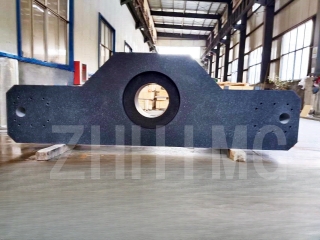Granite machine bases are popular in a variety of industrial applications, especially in precision machining and metrology. One of the most significant advantages of granite machine bases is their light weight, which helps improve stability and performance.
The weight advantage of granite machine tool bases stems from the inherent properties of the granite material. Granite is a dense igneous rock composed mainly of quartz, feldspar, and mica. This density means it has a thick structure, which is crucial to minimizing vibrations during processing. When the machine tool is mounted on a heavy-duty granite base, it is less susceptible to external interference, improving the accuracy and repeatability of machining operations.
Additionally, the weight of the granite machine base helps to dampen vibrations from the operation of the machine itself. This vibration damping is crucial to maintaining the accuracy of the machining process, as even slight vibrations can cause measurement deviations and affect the quality of the finished product. The weight of the granite absorbs these vibrations, resulting in smoother operation and a better surface finish.
In addition to stability and shock absorption, the weight of the granite machine base also contributes to its durability. Granite is resistant to wear and tear, and its heavy nature ensures it stays firmly in place, reducing the risk of shifting or dislodging over time. This long life makes granite bases a cost-effective investment for businesses looking to increase their processing capabilities.
In conclusion, the weight advantage of granite machine bases plays a vital role in its effectiveness in industrial applications. By providing stability, shock absorption and ensuring durability, granite machine bases are an excellent choice for precision machining and metrology, ultimately improving operational efficiency and product quality.
Post time: Dec-13-2024

